The best in holiday movies
Fed up with peace on earth? Check out ‘Jack Reacher,’ ‘Django Unchained,’ ‘The Impossible,’ ‘This is 40’ and ‘Rust and Bone’
Share
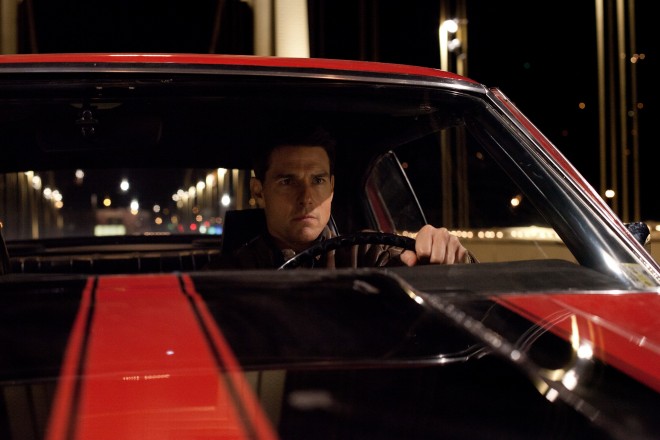
The Christmas rush of holiday movies is upon us, and if you find this whole notion of peace on earth is already beginning to wear thin, they offer some harrowing alternatives. Two of them, Jack Reacher and Django Unchained, had their premieres cancelled last weekend because their scenes of gun violence were considered inappropriate so soon after the Newtown massacre. Jack Reacher, which reboots Tom Cruise’s career as a action hero, has landed with especially unfortunate timing in light of the Sandy Hook massacre—it opens with a scene of a sniper killing five random civilians, including a mother holding a young child. Django, Quentin Tarantino’s tale of slave liberation, is tale of merry vengeance that opens Christmas Day.
Jack Reacher opens Dec. 21, along with Judd Apatow’s fractious family comedy This is 40. Those two studio pictures will likely lead the weekend box office, but also opening Dec. 21 are The Impossible and Rust and Bone, a pair of potent dramas from European directors that could win Oscar recognition. The Impossible is the harrowing tale of a family on holiday torn apart by the 2004 Boxing Day tsunami; Rust and Bone is a romance about an animal trainer (Marion Cotillard) who loses both her legs to a renegade killer whale. No one ever said escaping Christmas would be a walk in the park.
So many movies, so little time. Here’s the rundown:
Jack Reacher
As a fan of Lee Child’s Jack Reacher novels, I was as mortified as everyone else when it was first announced that the 5’8″ Tom Cruise would play the 6’5″ Reacher It seemed like a historic coup of miscasting. Since then Child has endorsed both Cruise and the movie, which is loosely based on One Shot, the ninth novel in the Reacher series. Now that I’ve seen it, I still feel Cruise is miscast, and not just because he’s too short. Size doesn’t matter so much on the big screen. But character does. Reacher is a rugged Army veteran, a multi-decorated former U.S. Military Police Major, who has gone rogue and become a drifter. Cruise doesn’t look like he’s a veteran of anything but the gym and the red carpet. Reacher, who has a brutal manner and a forensic intellect, is cool, detached and laconic. He’s like a human bullet: smooth, fast and hot. Too intensely polished for the role. That said, he’s an athletic actor who is always impressive in hand-to-hand combat. He functions best with blunt, minimalist dialogue, and in that sense he makes the character his own.
Still, it’s hard to recognize Child’s character. There’s a sense here that Hollywood has bought the Reacher franchise and stripped it for parts. One of the highlights is an extended car chase scene, with Cruise behind the wheel of a muscle car. The filmmakers have admitted this was an attempt to customize the role for Cruise, who is a skilled race driver. It also steers Child’s character-driven procedural into action movie cliche. Directed by Christopher McQuarrie (who co-wrote Valkerie and The Tourist), Jack Reacher unfolds as a conventional mystery/thriller. Reacher, who’s described as “a ghost,” appears out of nowhere to help the accused sniper’s lawyer (Rosemary Pike) investigate the crime, while her district attorney dad (Richard Jenkins) takes charge of prosecuting the case. Robert Duvall pops up in an third-act cameo as the grizzled owner of a gun range. Leading the gang of bad guys, director Werner Herzog plays a sinister kingpin, a survivor of a Siberian prison camp named The Zec. This droll casting gimmick has the effect of making the villain more comic than scary, as Herzog, with that trademark accent, recalls how he once chewed off his fingers in the prison camp to avoid gangrene. It’s as hard to forget Herzog is Herzog as it is to forget Cruise is Cruise.
McQuarrie’s dialogue is juiced with plenty of Lee Child zingers. But coming from the mouth of a movie star who has transformed Reacher into Hollywood action hero, they can seem disingenuous—especially when Cruise says, “I’m not a hero—I’m a drifter with nothing to lose.” Yeah, sure.
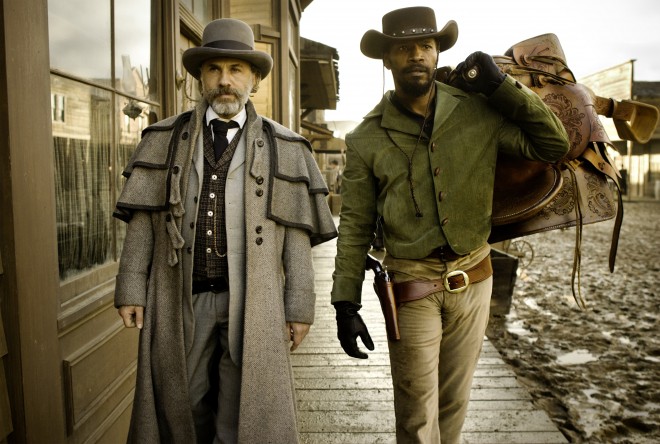
Django Unchained
For a movie about slavery rife with bloodshed, torture and dialogue that uses the N-word 109 times (according to Variety), it’s uncanny that Django Unchained manages to be such an enjoyable and harmless joy ride. That is the singular talent of Quentin Tarantino. In this giddy revenge movie, which slaloms between comedy and drama, Tarantino deftly re-purposes the formula of Inglourious Basterds. But in this case the villains are slave-owners in the Deep South rather than Nazis in the Third Reich. Once again Christoph Waltz is cast as a bounty hunter, except this time he’s a good guy—a gun-slinging German sophisticate who unshackles Django (Jamie Foxx) from bondage and supports him in a quest to find and free his sweetheart, a plantation slave with the hilariously Wagnerian name of Broomhilda (Kerry Washington).
Tarantino has crafted an inspired genre mash-up, a Slave Lib spaghetti western with a bloody streak of blaxploitation. Foxx plays the black cowboy hero strong and silent, cooler than Clint. The director, meanwhile, is as creative with his casting as he is with his soundtrack choices, which include Johnny Cash. It’s a treat to see an Don Johnson show up as a plantation owner named Big Daddy, and a significantly aged Samuel L. Jackson play the obsequious “house Negro” working for a plantation owner portrayed by Leonardo Di Caprio doing his best Colonel Sanders. Both Johnson and Jackson are virtually unrecognizable. If Jack Reacher is a casting travesty, Django Unchained is another example of casting genius from Tarantino.
As for the violence, there’s gobs of it. But Quentin rides the line between exploitation and good taste with a sensible double standard. He respectfully tends to cut away from the grisly scenes of slaves being tortured and abused, yet revels in the shoot-em-up pageants of Django taking bloody vengeance—raising a joyful noise with bright red fountains of gore. And if that doesn’t say Christmas, I should add that a significant chunk of the movie takes place in the snow. Django Unchained, by the way, ranks on my 2012 Top 10 list.
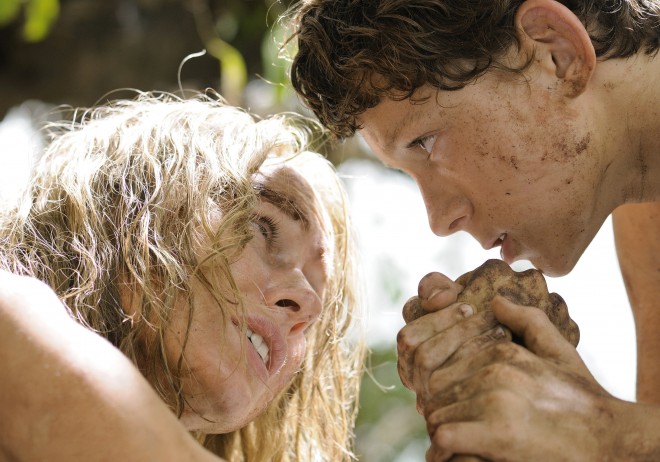
The Impossible
After the Sandy Hook massacre, any random real-life horror that cuts down innocent lives in the space of a few moments takes on new meaning. And though The Impossible has nothing to do with gun violence, it too will make parents want to “hold their children a little closer.” Based on a true story, this harrowing drama stars Ewan McGregor and Naomi Watts as parents vacationing in Thailand who become separated from each other, and their children, amid the devastation of the 2004 Indian Ocean tsunami. The spectacle of devastation—a gigantic wall of water smashing through a beachfront paradise—is unlike anything I’ve seen. Clint Eastwood directed a pretty impressive tsunami scene in Hereafter (2010). But The Impossible‘s Spanish director,Juan Antonio Bayona, goes beyond that. Aside from the sheer destruction, what makes these disaster scenes so riveting is the level of visceral acting in hurtling floodwaters that are clearly not computer generated—especially by Naomi Watts, as a lioness mother fighting to save herself and her children.
Bayona directs the action with admirable detail and realism. The cast, both children and adults, turn in superb performances. But as the waters subside, and the story teases out the family members’ attempt to find each other, despite the undeniable suspense of their search, the focus on the fortunes of a white tourist family amid a catastrophe that claimed some 275,000 victims makes the final catharsis, and salvation, feel a bit hollow. To be fair, the film points up the tragic contrast between individual survival and massive loss of life. Yet packaging this event into an entertaining thriller—no matter how powerful and well intentioned—leaves a disturbing aftertaste.
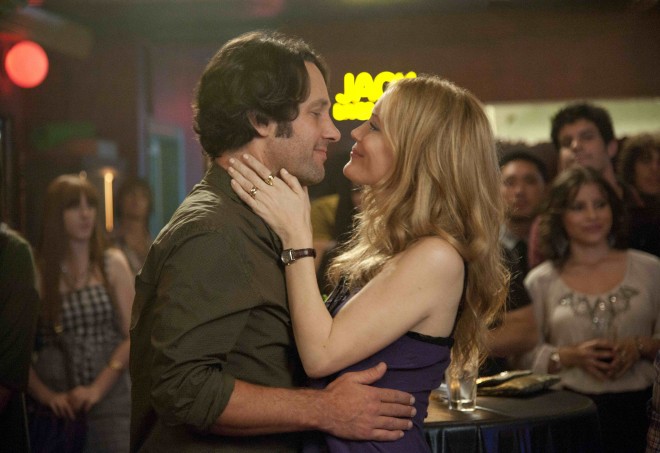
This is 40
Here’s a movie about family with decidedly less dramatic problems. Mom and Dad are both toying with mid-life crises as they turn 40. They need a slightly bigger house. Mom is upset that Dad is doping himself with turbo boosts of Viagra. And she complains he eats too many cupcakes. Mom is a little too fond of her personal trainer. Dad’s indie record label is on rocks. Mom owns a fashion shop where a salesgirl is stealing . . . and so on. But these are such comically petty woes, and the filmmaker seems aware of that.
Amid all the gun violence, torture and wholesale slaughter that dominate the holiday movies, Judd Apatow’s This is 40 offers a stocking stuffer bulging with smart, relatively harmless comedy. The movie is not as good as Knocked Up or Bridesmaids. The story is not as strong. But it’s loaded with sharp observational wit. Like most of Apatow’s movies, it defies the rule that relationship comedies should be brisk and short; it clocks in at 134 minutes. But as usual, as he gives us a whole lot of movie for our money. Apatow is never boring: I’m always happy to sit through one of his films, no matter how shambling things get.
This is 40 serves as a partial sequel to Knocked Up, picking up the lives of its B-story characters, Pete (Paul Rudd) and Debbie (Apatow’s wife, Leslie Mann), a few years later. The whole family is back, including the two daughters, played with great aplomb by Apatow and Mann’s own daughters, Maude and Iris. The film’s motherlode of observational wit has a memoir-like ring of truth, which reflect the comedy’s improv roots and the fact that Apatow mined his own family for material. Mann, of course, is closer to the source material than Rudd, who looks far too buff to have a cupcake eating disorder. And as an actor perennially cast at Mr. Nice Guy, he’s not so convincing when he has to play dirty and get nasty in the domestic meltdowns. But I quibble. While This is 40 may lack narrative elegance, it’s a good romp, with of bonus features—from a droll turn by Jason Segel as a horn-dog personal trainer to a self-deprecating cameo by Graham Parker playing himself as a faded rock legend.
Apotow is clearly the new king of comedy—his current guest-edited edition of Vanity Fair makes it official. In one sense, he’s the successor to Canadian comedy kings Ivan Reitman and Lorne Michaels, marshalling a virtual studio of talent while busting every sex-drug taboo in sight. But he’s also his generation’s Woody Allen. Like the Woody in his youthful prime, Apatow excels in the contemporary comedy of manners, drawing observations from his own life with satirical bite. But he works on a broader canvas that finds room for messy issues of kids and motherhood. Like Allen, he cultivates a stable of ensemble players, but he extends its hegemony through movies he produces as well as those he directs. Unlike Allen, Apatow remains behind the camera. Yet his personality, and his influence, seem no less pervasive, and his movies reach a much wider audience.
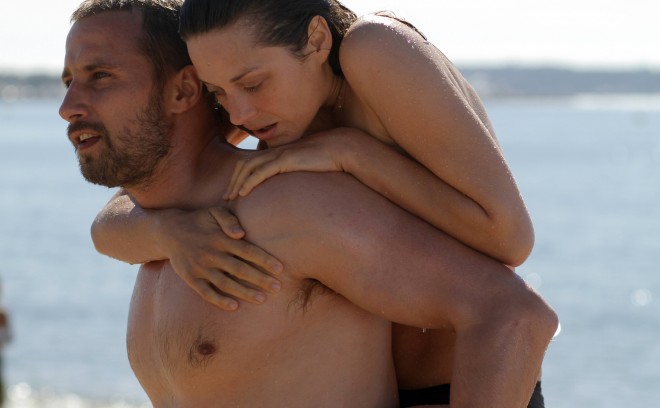
Rust and Bone
I haven’t seen this film since Cannes, some seven months ago, so my memory of it is sketchy, but it sits well in the imagination. Directed by Jacques Audiard, the French director who gave us the visceral prison movie Un prophète, it’s an urgent drama grounded in the same breed of gritty naturalism. The story unfolds on the French Riviera, a very different Riviera from the one where it premiered in Cannes. Ali (Matthias Schoenaerts) is a homeless drifter trying to scrape together a living for himself and his young son. Finding refuge with his sister in a cramped apartment in the South of France, he has dreams of making it as a martial arts fighter, while working as a bouncer at a nightclub. There, he has a fleeting acquaintance with Stéphanie (Marion Cotillard), who trains killer whales at an amusement park. The next time they meet, she is a double amputee, having lost her legs in an altercation with an orca. A romance ensues. What remains in my memory is above all the fierce performance by Cotillard, who’s likely to receive an Oscar nonination. Acting without appearing to have legs may be a feat of computer graphics, yet it also requires the actor to do some serious conjuring. Schoenaerts has an even more stoical role as the straightman, but he creates a strong impression as a tender brute, with more going on behind his eyes than first appears.
For such a precise and rigorous realist, Audiard is possessed with a compelling visual style, the kind that never yanks us out of the film’s reality. French directors have a knack for that. With a score by Alexandre Desplat (The Tree of Life) and a soundtrack that features Katy Perry, this movie has more seductive power than you might expect from a tortured romance between an amputee and a bouncer. Oh, and just in case you think the movie’s premise is so weird only the French could have dreamt it up, Rust and Bone is based on a 2005 short story by by a Canadian author, Craig Davidson.